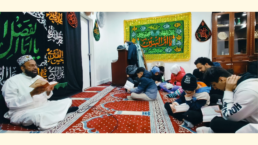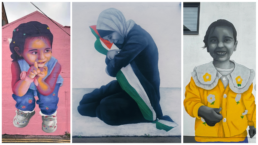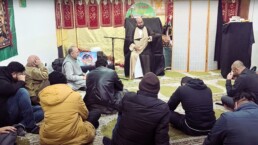A Sunday Children’s Quiz With a Twist, Ft. Imams, Namaz & Ethics
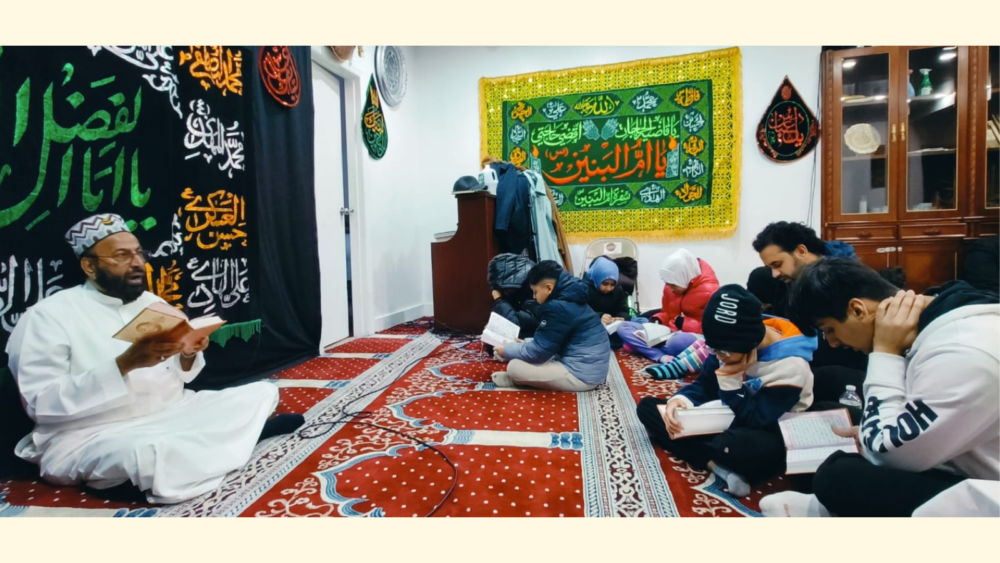
NEW YORK — A children’s quiz is on, in full swing. A dozen or so kids are seated on the floor in a semicircle in front of the quizmaster, answering his questions with aplomb. The rapid-fire questions, however, are not about current affairs or state capitals. Instead, they are about the names of revered imams and types of Muslim prayers.
It’s Sunday school at the Al-Mahdi Foundation mosque on Brooklyn’s Coney Island Avenue, and the children are being quizzed about their knowledge of Islam and Shia history.
They are asked to name the five pillars of Islam. “Who will count them for me?” enquires the quizmaster, Dr. Sakhawat Hussain, the founder of the Al-Mahdi Foundation. The children are eager to respond.
Nine-year-old Syed Mujtaba Haider says this is what he likes most about Sunday school at the masjid. She is particularly fond of the imam, whom she calls Maulana, meaning a learned Muslim scholar. “It’s fun, reading the Koran and answering Maulana’s questions. So, you can have more knowledge,” says the fourth-grader, rather knowledgeably.
Ameer Qaim Raza is a year older than Mujtaba. He’s come all the way from Staten Island. Why make the trip to Brooklyn every Sunday? “Because I get to see my friends and we get to read the Koran,” he says.
The quiz continues. “What is the meaning of roza?” “Fasting,” answer the kids. There are around nine boys, and three young hijab-clad girls.
“Which month is obligatory to fast?” The children respond immediately, “Ramadan.”
Can they name the five types of namaz or prayers Muslims are “obligated to perform everyday”? Yes, they can.
As the children continue answering his questions correctly, Hussain says, “You guys are getting expert, Mashallah (Allah has willed it). Your class is very successful today.”
“Can anyone name the 12 imams?” Unlike many of the other questions that would be applicable to all Muslims, this question is specific to the Shia fold, to which the maulana and his students belong.
“Imam Ali Alaihis Salam…Imam Hasan Alaihis Salam…Imam Hussain Alaihis Salam…,” the maulana and his students echo one another and go through the list of twelve. The “Alaihis Salam” said at the end of each name stands for “Peace be upon him,” an Islamic honorific used after naming holy figures.
They must know the names of the twelve imams, the maulana reminds his class. “Even if you are sleeping, and you woke up, and someone says, can you tell me the names of the twelve imams, (you should) say yes,” he tells them.
Interspersed in between the Q&A are lessons in ethics and morality from the quizmaster.
In the middle of his quiz, for example, Hussain says, “We are obligated to stop community members from committing sins – when someone is cheating, abusing, lying.” He adds, “But always be humble, be polite. Don’t get aggressive – Islam is peace, tolerance, forgiveness, love and harmony, politeness, this is Islam.”
Muhammad Danial Raza, a 15-year-old who had also come from Staten Island, said that hearing the line about Islam being a religion of peace and harmony made him happy. “It is, it’s true,” he tells me. “Islam is peace. It’s a good religion.”
Hussain cautions the children, “Do not become addicted to getting revenge.”
“I kind of get angry to people sometimes,” six-year-old Zamin Raza tells me.
“But Maulana said to be kind, right?” I ask him.
“Yes,” Zamin admits.
“I have a question - what is the meaning of ethics?” asks Hussain in class.
He answers the question he has posed, “When you get home, you say salaam to your parents, that is ethics. You will not shout. You will not bother. You won’t tease, you won’t back-bite, all this is ethics.”
Hussain adds, “Ethical values are more important than each and every thing.”
There are some more questions. A reminder to do the homework, and not to miss future classes. And then it’s a wrap.
The children leave. And adults come in and take their place. Sunday school is over, but the lessons shall continue. It’s time for the grown-ups now.
When Walls Break Barriers: How an Artist’s Murals in Ireland Forged a Life-Saving Friendship From Dublin to Gaza
DUBLIN — Kneeling down on the ground, Palestinian journalist Samia Alatrash wrapped her arms around the lifeless body of her two-year-old niece Masa. Israel’s bombing of Rafah in southern Gaza had killed Masa, her four-year-old sister Lina, and both their parents — in one day. October 21, 2023.
As images of Samia hugging the tiny shroud were beamed across the world, more than 4,000 kilometers away in Dublin, it prompted Irish artist Emmalene Blake to pick up her colors and paint murals of Samia and Masa.
What followed was the forging of a friendship between two strangers halfway across the world, from Dublin to Gaza. Now, more than five months later, that unlikely connection is what has proved instrumental in helping 26-year-old Samia finally evacuate Gaza and escape the war that has killed so many members of her family.
This is the story of their friendship, from Ireland to Palestine, and how it helped save Samia’s life.
______
The Night Samia Prayed Endlessly
Samia remembers the night of October 20, 2023, all too well, and painfully.
It was almost a fortnight into the war, and Israeli forces were bombing Samia’s hometown of Rafah. Samia says she couldn’t get in touch with her sister, Samar, after 11 p.m., when the bombing intensified.
“They were bombing everywhere, so no one could get to my sister’s house,” she recalls in an interview over the phone.
Terrified, Samia began to pray. “From 11 p.m. to 6 a.m., I was praying to Allah, can this bombing stop?” She couldn’t sleep. All she did was think about her sister Samar and her nieces Masa and Lina. “It was so difficult, it’s not fair. I was waiting for the morning, to go and hug them.”
But the morning would only confirm Samia’s worst fears. “Around 7 o’clock, I found out that I have lost all of them — my sister, Samar; my beautiful nieces, Masa and Lina; and my sister’s husband, Dr. Loay Khader. I felt that I had lost a part of my heart, my soul.”
Samar had helped raise Samia and their brother, Mohammad, after their mother died when Samia was only six years old. Even months after Samar’s passing, Samia struggles to speak of her sister in the past tense.
“Samar is not only my sister, she is my mother and my friend. With her death, I felt for the first time that I am orphaned. I cannot imagine that I have lost them forever. I want to hug them, and go on a picnic with them.”
As Samia embraced Masa, unwilling to let her go, photographers nearby clicked what has become one of the defining images of the ongoing war.
When Irish artist Emmalene Blake saw the photograph, it moved her deeply. “I keep crying the last couple of weeks. It’s all I can think about,” she told a friend.
Emmalene, who teaches art, design and mathematics to early school leavers, was so moved by the image that it made her want to paint Samia and Masa on a wall in Dublin. And so, the 36-year-old artist picked up her spray paints, reimagined the photograph, and recreated it as a mural in the city’s Harold Cross neighborhood.
The only change she had made to the photo: The shroud covering Masa was painted as a Palestinian flag.
News of the mural in Dublin traveled far and wide, and a picture of Emmalene's artwork reached Samia. In early November, on an Instagram video of Emmalene painting the mural, Samia wrote in memory of her niece, “My heart is broken without you.”
Touched by her artwork, Samia also reached out to Emmalene. "You painted me and my sweet niece Masa," she told her.
Emmalene recalls, “I told her I’ll sell t-shirts and sweatshirts and try and raise funds for her.”
Samia was beyond grateful. She says Emmalene was the first person to connect with her during the war and offer to help her.
In the face of unspeakable tragedy, Samia had found what felt like a personal solidarity across borders. And so, in those most unfortunate of circumstances, the Palestinian journalist and the Irish artist forged a friendship.
“I talk to her pretty much everyday now,” says Emmalene.
______
Mission Evacuation
Emmalene and Samia would keep in touch regularly, and Samia would update her friend about the situation in Rafah. It was rarely good news, but one day, Emmalene noticed that Samia seemed especially fearful.
“She got in touch with me and said there was a family 10 meters from where she was staying that was bombed and killed. And she was getting really scared.”
Upon getting that SOS from Samia, Emmalene sent over the funds she had raised till then by selling copies of her artwork on Palestine. They hoped that the amount would be enough for Samia to evacuate Gaza.
By then, Samia’s other surviving relatives had decided they wanted to escape from Gaza, too. That would need more funds.
Emmalene was ready to double down on her efforts, and she wasn’t alone.
She says, “I was getting messages from a few different people on Instagram about how they could help Samia. So we set up a WhatsApp group with everyone who wanted to help with evacuations of Samia and her family.”
Soon, there were around 10 people in the group, from Ireland and Palestine, all involved in planning and coordinating the efforts to relocate Samia and her family out of Gaza.
Emmalene said, “At the moment, we’re trying to raise funds for her brother and her cousin and her cousin’s family and her uncle to evacuate as well.”
“What's the WhatsApp group called?” I asked Emmalene.
“Evacuations,” she replied.
At the time of writing this, ‘Help The Alatrash Family Evacuate’, the fundraiser organized by Emmalene, has received more than 370 donations, and raised over $33,000 for Samia's family.
______
Leaving Home Behind
When I met Emmalene in Dublin in mid-March, she had said that Samia was “just waiting now for her name to be called at the border.”
She was waiting to flee the war. And as she waited, she would often break into tears. “I was crying, crying, crying… all the time.”
After waiting for weeks on end, hoping against hope that her name would be next, Samia’s name was finally called earlier this week.
On Sunday, April 7, at around half past seven in the morning, she got on a bus in Rafah and began the journey away from the place she had always called home — Gaza.
Almost 24 hours later, at around 5 am on Monday, she reached Nasr City in Egypt.
“I am so confused… I don’t know how I feel,” she tells me hours after her arrival in Nasr City.
She says, “I am feeling sad because I am leaving Rafah, because I am leaving my family, my only brother, my grandmother…I am so, so sad.”
She hopes that her 20-year-old brother Mohammad will also be able to evacuate to Egypt. Emmalene and the others are working on it, but none of them know how long the process could take.
Nasr City is a little over 300 kilometers away from Rafah. But the distance feels much longer for Samia. She mourns the loss of leaving where she belongs, “I don’t have a home now because it was destroyed.”
She says she hopes this is her chance for a life “without bombing, without genocide, without killing.” And she looks forward to getting back to working as a freelance journalist.
______
The Irish Bond With Palestine
In Ireland, Emmalene isn’t an exception when it comes to expressing a strong solidarity with Palestine. The country has had a deep history of support for the Palestinian cause.
Ahead of St. Patrick’s Day last month, at a meeting between then-Taoiseach (Irish prime minister) Leo Varadkar and US President Joe Biden, the Irish leader said, “As you know, the Irish people are deeply troubled about the catastrophe that’s unfolding before our eyes in Gaza.”
He added, “When I travel the world, leaders often ask me why the Irish have such empathy for the Palestinian people. And the answer is simple — we see our history in their eyes. A story of displacement, of dispossession, and national identity questioned and denied, forced immigration, discrimination, and now hunger.”
“We were occupied by Britain for 400 years, so we definitely have a kinship or solidarity with Palestine,” says Emmalene. She compares the Great Famine of the 1840s, when Ireland faced years of hunger during British rule, to the current widespread starvation in Gaza.
Speaking of the Irish famine, she says, “The potato crops failed, but there was plenty of other food. But Britain was shipping all of the meat and all of the other food out of Ireland into Britain. So the famine wasn't a famine, it was a genocide.” Around a million Irish people are estimated to have died during the famine, and millions more emigrated from the island.
Comparing it to the situation unfolding in Gaza, Emmalene says, “Hunger is being used as a weapon of war at the moment. They're not letting the aid in. It's a man-made famine.”
“They can feel my pain,” says Samia. “I have received so many messages from people in Ireland, they send me voice notes in support. That makes me feel stronger. I love them because they are supporting me and the people in Gaza. The people in Ireland are with the people in Gaza, every day, every night.”
______
What the Two Friends Hope For
Upon reaching Nasr, Samia reunited with her cousin Soha, who had managed to evacuate a couple of days earlier. The two of them recorded a video for Emmalene and the others who had helped them flee Gaza. Soha began, “Hi Emma, Ciara and everyone, this is the hotel we are staying in…” Samia looked on and smiled.
Emmalene shared the video on Instagram and wrote, “Samia is out! We have them booked into this hotel in Nasr City in Egypt for a few more nights until we can get an apartment sorted where they can wait for the rest of their family.” She added, “We still need to raise more funds to get the others out.”
Now in Nasr, Samia hopes to get back to working as a journalist. And she hopes for an end to the war. “Stop the war. Stop killing. Stop destroying houses and dreams,” she says.
And Emmalene, in addition to selling her artwork to raise funds for Samia’s family, plans to keep painting for Palestine. She says, “It’s the biggest atrocity over a lifetime. So, I’m going to continue painting for as long as it goes on.”
The two of them have never met. Samia hopes she can change that someday. “I hope I meet Emma face to face and all the people in Ireland as soon as possible.”
Her gratitude for Emma, as she calls her, knows no bounds. “Emma is a kind and beautiful woman,” she says. “Emma is now my best friend. Because everyday, she calls me and asks about me.”
And like she does every so often, Samia recalls the mural of Masa that Emmalene had painted. “She painted my sweet niece Masa.” She says it gives her strength to think that people in the world remember Masa through that painting.
Samia is referring to another mural in Dublin that Emmalene had created — a massive mural of Masa on a wall painted pink.
Emmalene had also written a poem for Masa to go along with the mural, titled ‘Second Time Painting You’. Here’s an excerpt of the poem.
“Two year olds don’t worry about time.
I didn’t know this about you,
when I painted you before.
Didn’t see it.
Didn’t see your smile.
Didn’t see the feather in your hair.
Didn’t see your flowery runners,
that match your flowery jeans.
Didn’t see the baby hairs
all along your forehead
you had yet to grow out.
See when I painted you before,
You were shrouded in cloth,
Your auntie clutching your lifeless body,
Rocking back and forth,
Whispering words meant only for you.”
For this mural, Emmalene chose to not paint a Palestinian flag or anything on the mural to denote that Masa was a Palestinian. “The reaction I had been getting while painting it was people going like, “Oh my God, such a gorgeous child!” So, I want people to have that reaction and then see the plaque with information about the mural — for them to read the poem and then for it to hit them.”
Emmalene adds, “I think there’s a creche down the road from where I painted it. And once it was nearly finished, a good few mothers who had kids around the same age would go by and would tell their kids, “Oh look at that lovely little girl, isn’t she just like you!””
“That’s the reaction I wanted,” says Emmalene. “It’s just a child, it could be any child.”
Next to her first mural of Samia and Masa too, Emmalene had painted three children, one of whom was wearing a Jewish kippah and another a keffiyeh. “What I was thinking was — kids are kids. It doesn't matter where they're from, what religion they are. All any kid really wants is to be safe and be happy. So, whether it's Palestinian kids, whether it's Israeli kids or Jewish kids, whether it's any other kids in the world, that's all they want.”
The mural of the three children showed them playing with letter blocks. The children had built two towers with the blocks. They read, “Peace please.”
Why Songs of Zainab Moved This Shia Congregation in Brooklyn to Tears
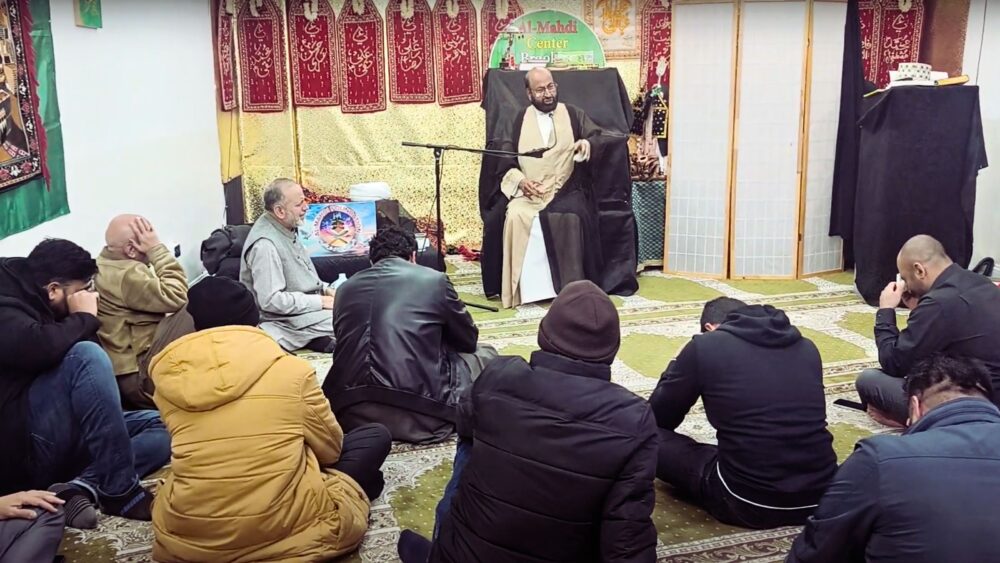
NEW YORK - A couple dozen grown men are seated on the floor, sobbing in unison.
It’s a rainy Sunday evening on Coney Island Avenue, in a Brooklyn neighborhood better known as Little Pakistan. A small crowd has gathered in the prayer hall of the Al-Mahdi Foundation’s masjid, a Shi’a mosque.
There are songs being sung, and poems recited. Each verse pays homage to Zainab bint Ali, the granddaughter of Prophet Muhammad.
The previous day, the 27th of January 2024, was also the 15th of Rajab 1445, as per the Hijri or Islamic calendar. It was the day that Zainab is said to have passed away, close to 14 centuries ago. The Shia congregation in Brooklyn is mourning Zainab by retelling stories of her suffering and bravery.
“Adab se kahiye, salaam Zainab (say it with respect, salutations to Zainab),” sings Rashid Zaidi, a worshiper at the mosque.
Prior to her death, Zainab had been taken captive by the forces of Yazid, the second chief of the Umayyad Caliphate. This was after the Battle of Karbala, in which Zainab’s brother Hussain and several of her relatives are said to have been killed by the forces of Yazid.
Zainab is remembered by the gathering for her resolve and resistance in the face of oppression. “Quran agar Hussain, tafsir hai Zainab (If Hussain is the Quran, then Zainab is its interpretation)", recites a worshiper.
Shi’a Muslims, who comprise a minority within Islam, are also a minority among the Muslim population in New York City. The majority of mosques in the city belong to the Sunnis. The holy day commemorating Zainab’s death, however, holds significance for Shi’a and not Sunni practitioners, and the Al-Mahdi masjid in Brooklyn is one of the few places in the city where such a commemorative event is being held.
As Zainab’s hardships in captivity are recounted, many of the members in the congregation cannot bear to look. They cup their faces in their hands in grief. An elderly man crinkles his tearful eyes and slaps his thighs. Next to him, 65-year-old Hasan Raza beats his chest lightly. He laments, “People slayed the Prophet’s family just for the lust of power. When we remember that, we cry.”
Syed Basit Naqvi, a 43-year-old cab driver, explains his outpouring of emotions during the commemoration, “Zainab’s captors had tried to humiliate her by walking her through the streets and snatching her hijab away from her. If I close my eyes, I feel like I'm looking at those things happening in front of me.” He adds, “You can feel it happening and you feel helpless.”
Channeling The Grief
“You relate to their grief, and the grief gives us a sense of belonging,” says Hussain Raza, a 36-year-old software developer from Pennsylvania, who attended the event in Brooklyn on Sunday. He adds, “Isn't that what everyone is looking for in the world - a sense of belonging?”
Raza continues, “When you listen, it goes in from one ear and then, I'm a software person so I'd say it goes into a loop, and then it goes to a different function in the body, your heart, your brain, and the emotion hits…and you tear up. It happens in milliseconds.”
Naqvi says, “The grief helps me - when you associate yourself with victims like them (Zainab and those alongside her), you tend to be more sympathetic with other people. The main purpose is so that you don't become the oppressors.”
He says it makes him want to help other people. “The grief softens your heart when somebody is in pain. Because when you're grieving people who have been killed like this, you cannot be cruel to anybody else.”
A young boy comes to remind Naqvi that they have to get going. It’s his nephew.
As Naqvi proceeds to leave the mosque, he remarks, “I don't feel angry on hearing the story. I feel that this thing happened in the past, but it shouldn't happen again. Never again.”

